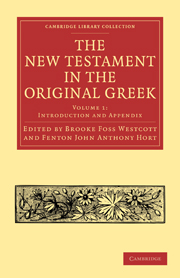II - NOTES ON ORTHOGRAPHY, WITH ORTHOGRAPHICAL ALTERNATIVE READINGS
Published online by Cambridge University Press: 29 August 2010
Summary
The principles which have been followed as to the orthography adopted in this edition have been explained in the Introduction (§§ 393-405). Often however the decision in favour of one spelling as against another is more or less precarious; so that a wrong impression would be produced if those spellings which, though not preferred, are also not rejected were left unrecorded. While therefore alternative readings of an orthographical character have been excluded from the margin of the text (Introd. § 403), it is fitting that they should have a place in the Appendix.
What spellings are sufficiently probable to deserve inclusion among alternative readings, is often difficult to determine. Although many deviations from classical orthography are amply attested, many others, which appear to be equally genuine, are found in one, two, or three MSS only, and that often with an irregularity which suggests that all our MSS have to a greater or less extent suffered from the efface-ment of unclassical forms of words.
It is no less true on the other hand that a tendency in the opposite direction is discernible in Western MSS : the orthography of common life, which to a certain extent was used by all the writers of the New Testament, though in unequal degrees, would naturally be introduced more freely in texts affected by an instinct of popular adaptation (Introd. § 176). For these reasons the limits of orthographical alternative readings can be only approximately fixed ; and readings not marked as alternative have sometimes been cited in the accompanying notes.
- Type
- Chapter
- Information
- The New Testament in the Original Greek , pp. 465 - 497Publisher: Cambridge University PressPrint publication year: 2010First published in: 1881



